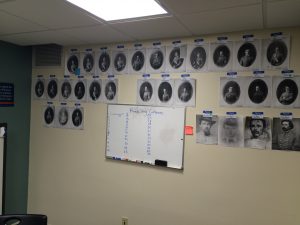During this week we were presented with a lot of definitions of Digital Humanities, from paragraphs to a simple “TBA”. To me the definition of Digital Humanities is truly “TBA” because it is a relatively new field that combines two already established fields with different objectives and different values. We develop digital humanities as we work on our projects, finding out what works, what does not, and what limitations we find on the way.
Like any field there should be principles and values that are held by those participating. Some of the ones that we talked about were openness, collaboration, connectedness, diversity, experimentation, etc. I think one of the most important values of digital humanities is openness. Openness is important to digital humanities because it brings the openness and access of the digital world to the kind of closed off world of humanities. Most studies of humanities are done in an archive or with primary sources that are not easily accessible or understandable to the public but with the digital component it brings the study of humanities to everyone and broadens the audience of the study of humanities. The study of humanities has been around for such a long time and is considered to only be interesting and understandable to a select group of academics, digital humanities brings a more modern approach to how we see humanities. For the longest time history was done by old white men, and still is today for the most part but more and more people from diverse backgrounds are getting into areas of history that were previously dominated by said old white males. Digital humanities makes it easier to get a foot in the door for people who are not the majority in their field. Like a civilian female researching West Point cadets involvement in the American Civil War.
I could easily write a paper or form an exhibit about these cadets but through digital humanities I have a platform to share my project with literally the world. These cadets gave everything so that their country might live and prosper, they deserve to have their story told and to be known for more than just their military merits, but for who they were as people. I want to humanize these cadets and give them life again, because so often in history we are so quick to put men like Custer, Cushing, and O’Rorke on pedestals and praise them for their military merits but then forget that they were actual people with feelings, thoughts, and personality. Through their letters and through digital humanities I hope to show that they were just young men who went above and beyond the call of duty and what was expected of them, even as West Point cadets where expectations were sky high. Through digital humanities I can combine their military merits with their life experiences as people and not simply military figures. Digital humanities allows me to humanize these young men by displaying their stories in a way that is accessible and entertaining to the public today. By making my project interactive through the tools of digital humanities it makes the project more personal and able to connect with more people. I look forward to the research I will do and the part my project will play in furthering the definition of digital humanities.

